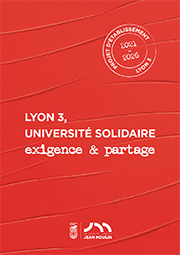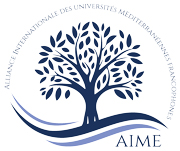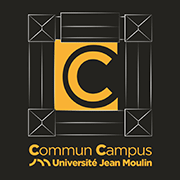AccueilRechercheProgrammes et productions scientifiquesThèsesThèses soutenuesThèses soutenues - 2006-2021Thèses soutenues - 2012
-
Partager cette page
- Recherche,
MANIGAND Nicolas
La pensée de la stratégie en Occident et en Chine.
Publié le 12 juillet 2012 – Mis à jour le 28 ao?t 2012
Thèse en philosophie soutenue le 4 Juin 2012 en cotutelle avec l'Université de Pékin (Chine).
L’apparition de l’arme nucléaire et son utilisation par les Américains en 1945 sur les villes japonaises d’Hiroshima et de Nagasaki ont été assez largement comprises en Occident comme marquant la fin des guerres chaudes directes et l’entrée du monde dans des guerres froides indirectes et totales. Dès les années 1950, le sentiment s’est fait jour au sein des milieux militaires occidentaux que l’?ge nucléaire nous éloigne, au moins partiellement, des conceptions stratégiques élaborées dans le cadre de la tradition clausewitzienne. De même, les revers que connaissent les armées occidentales au cours des guerres de décolonisation ont pu amener les stratèges de l’époque à s’interroger sur le bien-fondé de leurs réflexions sur l’action. Mais, plus que tout, la récente guerre contre le terrorisme, où ces mêmes armées suréquipées sont tenues en échec par un adversaire irrégulier qui évite la confrontation directe et cherche à user l’ennemi, sans qu’on puisse espérer jamais en venir totalement à bout, semble mettre carrément en question les présupposés mêmes de la ? science militaire ?. Par contraste avec l’impasse où les élaborations conceptuelles des Machiavel, des Clausewitz et, plus récemment, des John von Neumann, auraient conduit l’Occident, la tradition chinoise de réflexion sur l’action est per?ue, dans cette même partie du globe, comme plus adaptée aux nouvelles conditions du monde contemporain. Beaucoup sont persuadés que se trouvent chez le théoricien chinois du Ve siècle avant J.-C. Sun Zi un certain nombre de solutions pour triompher infailliblement dans toutes les situations conflictuelles du monde actuel. ? travers l’examen des grands textes par lesquels traditions occidentale et chinoise de réflexion sur l’action se sont construites, l’étude s’emploie à rétablir un équilibre, et si possible une certaine objectivité dans la fa?on de concevoir et d’estimer celles-ci. Elle dénonce certaines illusions – dont l’illusion idéaliste – dont sont parfois victimes ceux que fascine la tradition chinoise, et souligne en particulier que les choses tangibles tels que les territoires, les machines de guerre, la puissance de feu, ne sont pas entièrement relativisées par rapport à la connaissance, à l’information ou aux aspects plus ou moins virtuels de la guerre. En mettant en évidence les dynamismes qui structurent chacune des deux cultures stratégiques, l’étude montre surtout que la volonté de hiérarchiser celles-ci est vaine.
The invention of the nuclear weapon and its use by the United States in 1945 on the cities of Hiroshima and Nagasaki have generally been considered by Western countries as a shifting from direct hot war to indirect and total cold war. From the Fifties onward, there has been a growing feeling among Western military circles that the nuclear age strays, at least partially, from the strategic conceptions developed in the wake of the Clausewitzian tradition. Likewise, the setbacks experienced by Western armies during wars of decolonization led strategists back then to question the validity of their reflection on action. But most of all, the recent war on terrorism led by countries whose over-equipped armies are held at bay by an irregular adversary avoiding direct confrontation, and wearing down the enemy leaving no hope of a total elimination seems to throw into question the presuppositions of military science. Contrary to the dead-end where the conceptual elaborations of Machiavelli, Clausewitz, and more recently, John von Neumann, and their followers, would have led Western countries, the Chinese tradition of reflection on action is perceived, in this same part of the world, as more adapted to the new conditions of the modern world. Many among them are convinced that they can find in the writings of a 5th century BC Chinese theoretician, Sun Zi, a certain number of solutions to prevail unerringly in any given conflictual situation in the world. Basing itself on the study of great writings through which oriental and occidental traditions upon reflection on action have been built, this study strives to re-establish a balance, and if possible, a certain objectivity in its approach to conceive and estimate this reflection. This study also denounces certain illusions, among which include the idealistic illusion, sometimes affecting thinkers fascinated by Chinese tradition, and particularly stresses the fact that tangible things such as territories, war machines and fire power are not entirely relativized in relation to knowledge, information, or aspects of war more or less virtual. By highlighting the dynamisms structuring the two strategic cultures, this study shows above all that trying to organize them into a hierarchy is pointless.
Mots clés : stratégie ; armée ; guerre ; action ; terrorisme ; nucléaire ; Chine ; Occident ; Sun Zi ; Clausewitz
Keywords : strategy ; army ; war ; action ; terrorism ; nuclear ; China ; Western World ; Sun Zi ; Clausewitz
Directeur de thèse : Daniel PARROCHIA
Xiaonzhen DU
Membres du jury :
Gérard CHAZAL, Professeur, Université de Bourgogne, Dijon
Jean SALLANTIN, Directeur de recherche au CNRS, LIRMM, Montpellier
Dominique LUZEAUX, Délégué Générale pour l'armement (DGA) en qualité d'expert
Xiaozhen DU, Professeur, Université de Pékin
Daniel PARROCHIA, Professeur, Université Jean Moulin Lyon 3
Mention : Très honorable avec les félicitations du jury
Equipe d'accueil : IRPHIL
The invention of the nuclear weapon and its use by the United States in 1945 on the cities of Hiroshima and Nagasaki have generally been considered by Western countries as a shifting from direct hot war to indirect and total cold war. From the Fifties onward, there has been a growing feeling among Western military circles that the nuclear age strays, at least partially, from the strategic conceptions developed in the wake of the Clausewitzian tradition. Likewise, the setbacks experienced by Western armies during wars of decolonization led strategists back then to question the validity of their reflection on action. But most of all, the recent war on terrorism led by countries whose over-equipped armies are held at bay by an irregular adversary avoiding direct confrontation, and wearing down the enemy leaving no hope of a total elimination seems to throw into question the presuppositions of military science. Contrary to the dead-end where the conceptual elaborations of Machiavelli, Clausewitz, and more recently, John von Neumann, and their followers, would have led Western countries, the Chinese tradition of reflection on action is perceived, in this same part of the world, as more adapted to the new conditions of the modern world. Many among them are convinced that they can find in the writings of a 5th century BC Chinese theoretician, Sun Zi, a certain number of solutions to prevail unerringly in any given conflictual situation in the world. Basing itself on the study of great writings through which oriental and occidental traditions upon reflection on action have been built, this study strives to re-establish a balance, and if possible, a certain objectivity in its approach to conceive and estimate this reflection. This study also denounces certain illusions, among which include the idealistic illusion, sometimes affecting thinkers fascinated by Chinese tradition, and particularly stresses the fact that tangible things such as territories, war machines and fire power are not entirely relativized in relation to knowledge, information, or aspects of war more or less virtual. By highlighting the dynamisms structuring the two strategic cultures, this study shows above all that trying to organize them into a hierarchy is pointless.
Mots clés : stratégie ; armée ; guerre ; action ; terrorisme ; nucléaire ; Chine ; Occident ; Sun Zi ; Clausewitz
Keywords : strategy ; army ; war ; action ; terrorism ; nuclear ; China ; Western World ; Sun Zi ; Clausewitz
Directeur de thèse : Daniel PARROCHIA
Xiaonzhen DU
Membres du jury :
Gérard CHAZAL, Professeur, Université de Bourgogne, Dijon
Jean SALLANTIN, Directeur de recherche au CNRS, LIRMM, Montpellier
Dominique LUZEAUX, Délégué Générale pour l'armement (DGA) en qualité d'expert
Xiaozhen DU, Professeur, Université de Pékin
Daniel PARROCHIA, Professeur, Université Jean Moulin Lyon 3
Mention : Très honorable avec les félicitations du jury
Equipe d'accueil : IRPHIL
Documentation
Mise à jour : 28 ao?t 2012







